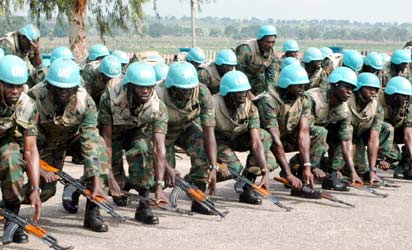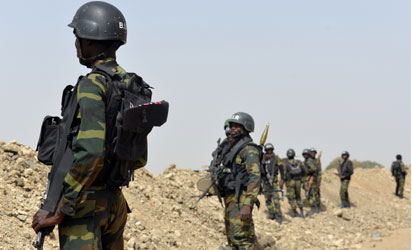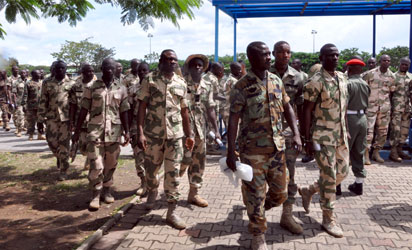 |
| Boko Haram War: Firsthand account of why Nigerian soldiers are fleeing from the terrorists and deserting the army |
A firsthand account of battlefield experience of Nigerian soldiers fighting Boko Haram terrorists in the Northeast of Nigeria has been revealed. Sabotage, low morale, environmental conditions, and incentives appears to be bane of Nigerian soldiers to defeat the insurgents who appear highly motivated. As a good number of Boko Haram fighters and trainers are former and current Nigerian soldiers from the northern region, it appears the Nigerian soldiers and the terrorists have similar military tactics and strategies, thus making it difficult for Nigerian forces to effectively counter the terrorists.
An army officer, nursing the wounds and deep feelings over the whole incident, spoke exhaustively to Saturday Vanguard about his battle field experiences at Gombe and Yobe axis and why he deserted the profession he loves so much.
Below is the excerpt.
‘’I have served Nigerian Army for about twenty years. I enrolled through the regular course.
I have served in almost all formations in the country. I am from the middle Belt part of the country, married with two children, a boy and girl. I have also served in foreign missions in Sierra-Leone, Liberia and Dafur and we always came out in flying colours. Sierra-Leone and Liberia were for peace enforcement while Dafur was for peace support missions. We fought real battles at Sierra-Leone and Liberia for about one year. We were there as a member of ECOWAS and we proved our mettle. It was popularly called ECOMOG. The battles were tense but rewarding in the sense that we were heavily equipped and all we needed for the war were adequately provided for us. During the battles we recorded very minimal casualty though. You know that it is difficult not to record casualties in war situations.
FEDERAL GOVERNMENT LARGESSE
‘’In spite of the fact that the war was being fought outside Nigeria, the Federal Government of Nigeria under General Abacha provided us with all we needed and when ever we complained of any inadequacy, the Federal government provided them without delay. That was the spirit and we relished and cherished it. It was such that we were all looking forward to being drafted back to continue with the war. But it is a totally different thing with the war against Boko Haram in the North Eastern part of Nigeria.
FEARS OVER ILL-PREPARATION
This is a war in which almost 95% of our soldiers fear to join. Our fears are not that we were not trained enough to face the challenges but simply because we seem not to be prepared, at all, for the war. A lot of sabotage, politics and other extraneous factors are seriously inhibiting the success of the war. Unfortunately, we are loosing a lot in men and materials. It is so much that whenever the toll will be taken, the world will weep for this country. Already, thousands of families are in deep grief, having lost their dear ones in the war.
As we speak, I have deserted from the battle field at Bajoga, Yobe State. Let me give you a vivid account of the circumstances that led to my deserting the profession I love so much.
MY STORY
Until the unfortunate and very painful AWOL,(Absence Without Leave) I was serving in Bauchi as a Sergeant. While carrying out our normal duties, I was abreast of the ongoing war my colleagues were waging with Boko Haram and I was inwardly praying for action whenever I would be drafted to the front. Alas, my battalion was informed of a certain foreign mission. I was ecstatic, knowing that we always triumphed during such missions. Unfortunately, when the real action came, I regretted joining the Nigerian Army.
FOREIGN MISSION SIGNAL
After the signal came for the mission, we started training from Ohafia in Abia State. Later on, we heard that the operation had been changed from peace keeping in Liberia to Zaman-Lafia in the North East. We thought it was a joke and when we finished the training at Ohafia, we were sent to Jaji in Kaduna State. It was at Jaji we realised that the rumour of going to the North East was true and we all knew that it meant going to fight the insurgents called Boko Haram. We were very sad because most of us were due for compensation and that was why they selected us to go for foreign mission. About 90% of us were victims of previous attacks at Bama and other areas and we lost both our loved ones and properties. So, military authorities selected us for foreign mission as a way of compensating us but unfortunately, we were diverted to go and fight Boko Haram insurgents.
MOVEMENT TO GOMBE
We, however, took it in good faith and after we completed our one month training, they moved us to Gombe. That should be around early January this year. On arrival around 2pm the next day, the Brigade Commander came to address us. To our chagrin, he told us that even members of Boko Haram were aware that we were coming, that they had sent a text message to him that we were coming to attack them with the local hunters and heavy equipment and that they were ready for us.
DISAGREEMENT WITH COMMANDER
The following day, he wanted to move us (about 600) to Mallam-Sidi area of the state but we objected because our Commanding Officer had not come and those heavy tanks, like the APCs and other supporting weapons were not equipped for the battle ahead.
The following day when the Commanding Officer came, he compelled us to move to the place, saying that it would be more conducive and safe for us to stay there than being left at the open and ill-equipped barracks in Gombe. We then moved to Mallam-Sidi where we spent almost two weeks before advancing to the war front. While we were there, they told us they were making provision for all those weapons that were not available. And, actually, while there, they brought three armoured tanks, replaced some of the APCs that were in bad condition and brought new ones.
MOVEMENT TO THE BATTLE FIELD
On a Sunday, precisely on the 8th of February, around 2am, we advanced towards Bajoga, a town between Yobe and Gombe States. We were there before 6am. Before advancing to the battle field,we were fed with tasteless jollof rice, that was as dinner. About 9.30 to 10 am we started advancing to the location where the insurgents were. While we were advancing, the three helicopter gun-ships that we were earlier promised would assist in the operation hovered round and landed. Even the Alpha jet came and all of us were jubilant and battle-ready to win at all costs.
HOPE DASHED
However, five minutes before we met with our target, the helicopter and alpha jet disappeared. Even at the peak of the battle, our commander called them for backup but they did not surface. The battle raged for over four hours, they were surging like locusts towards us with sophisticated weapons including ant-aircraft guns. In conventional wars, such weapons are not used on human beings. They are used to fell air crafts. But, the insurgents use them brazenly to kill our soldiers. It tears human body into shreds on contact.
OUR EQUIPMENT
It is pertinent to let you know how we were equipped for the war. Before the battle, they gave us three armoured tanks, three artillery guns, five APCs, grenade launchers and AK47 rifles with three magazines per soldier. But on the day we started advancing, only one armoured tank , five APCs, and artillery guns advanced with us. If we had gone into battle with, at least, the three armoured tanks, nothing would have made us lose the war. As the battle raged, it did not take time for their fire power to surpass ours.
SUICIDE BOMBING
Initially, we had upper hand, but they struck with two golf cars loaded with bombs and dislodged us. It was a suicide mission. The explosion covered the whole area with thick smoke and the insurgents used the opportunity to advance towards us. In the process, we were asked to withdraw because they were coming ferociously. We were killing them but they kept on advancing like bees. Then, it was almost 5pm.
RACE FOR SURVIVIAL
That was how the race for survival by our men started. You know the terrain is a very open and large expanse of land with scanty vegetation. It was just like running in a football field with no place to hide. We ran into a small settlement and they pursued us. They were quite familiar with the terrain but we were not.

We succeeded in crossing the first stagnant river, before we noticed the presence of our alpha jet which started backing us up. That did not deter the insurgents from pursuing and killing our soldiers one by one.
IT IS NOT THE WAR YOU KNOW
While we were running for dear lives, some soldiers were falling by the wayside after losing strength to continue with the long race for survival. In fact, because of the fact that we were not equipped with water bottles, our throats were drying up as we continued running. It got to a stage when dehydration set in and if you try to swallow saliva, it will be almost impossible and choking. Our spit was so white, slimy and it splattered on the faces of most of us due to exhaustion.
One of the most pathetic cases was that of a colleague who got exhausted and simply collapsed on the ground. He was even pleading with us to continue without him because he could no longer make it. One of our officers, a Lieutenant pleaded that we should lend a helping hand by jointly helping him to continue with us. His plea touched us and we tried our best to help but we were also too exhausted to help him.
BUT THE WAR THEY FOUGHT
Nevertheless, some of us tried to help him but we could not continue when we saw the way the insurgents were running towards us. We dropped him and only God knows what happened later. As we were running, bodies of many of our soldiers, both wounded and killed littered the open field. It was heart-rending seeing a close friend lying helplessly and you could not help because your own life was in grave danger and you were not sure of survival.
When we were about crossing the second shallow river, the villagers we met told us that we were in between Borno and Adamawa States, that from there to Bajoga was 75km. Surprisingly, the villagers were very friendly and even gave us water. They were about giving us food but advised that we should quickly continue with our journey in order to avoid the insurgents meeting us.
They arranged three vehicles that lifted us for about a kilometre and the driver refused to proceed further claiming that the road was not good. We quickly disembarked and trekked all night till around 5am when we entered a village and met members of the local vigilante who helped us and arranged for two Diana Trucks that carried us to Bajoga junction. From there, we entered another vehicle to Mallam-Sidi and that was where we met some of our soldiers with serious bullet wounds.
The wounded among us pleaded with the second-in-command to take them to the hospital in Gombe but he objected saying that order has been given to move everybody to Ashaka where we use as harbour. After some deliberations and objections, we had no option than to obey him. When we got to Ashaka, to our chagrin, instead of taking urgent care of the wounded, feeding us and even given us a day rest after our narrow escape, the Commander ordered that we should turn back and advance to the battle field. That was the final straw that broke the camel’s back. At that stage, many of us decided to dessert the Army; and that was exactly what we did.
I handed my gun to one of my colleagues to return to the armoury after I left in the midnight. I trekked for two hours to the main road before I boarded a bike that unfortunately missed the road and we saw ourselves back at Ashaka.
I then disappeared amongst the crowd at one of the checkpoints and went to the motor park where I boarded a vehicle towards Abuja. It took time for me to take that decision because this is a profession I love so much and I have put in about 20 years. Agreed that from day one, we signed to fight and die for our dear country, but of what use will it be when it was obvious to me that things could be done differently and we would have results. For instance, we were supposed to be paid N5000 daily but what our Commanders paid was N1000. If you sustain injury in the battle field, you spend your money treating yourself. The worst is that we were not adequately equipped for the war. We only got to battle field with our rifles, no kits, no vision goggles etc. and this is an oil rich country where politicians embezzle trillions yet, this battle that calls for the best in both incentives, morale and equipment is being fought this way at the grave expense of our dear lives. Our military is strong and can do better if well funded and equipped. As I speak, many soldiers have deserted the army.
Their families are starving in the barracks. The most painful aspect of the whole thing is that after the battle, no efforts were made to ascertain or give account of our dead and wounded soldiers. The dead are left in the battle fields while most of the wounded face agonising death. What the authorities do is to close accounts of soldiers not seen after few days.
The revelations are very significant as it has amply demonstrated that the Nigerian soldiers are will be incapable to protect Biafrans when the terrorist begin their move towards Biafra, which as their ultimate play.


No comments:
Post a Comment